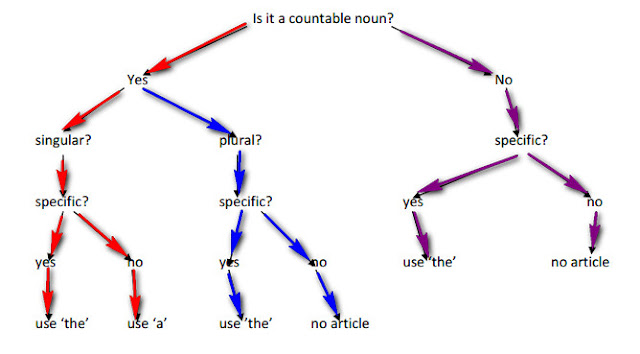Rules of using some and any
Some and Any
For many learners, the use of some and any presents a challenge. Although they learn
For many learners, the use of some and any presents a challenge. Although they learn
the rules
at an early stage, many students can still find this area of grammar confusing.
In my
experience, it is one of most frustrating areas of grammar outside the verb system
for students. There are also some subtle uses of some and any outside the scope of the standard
rules which can be problematic, even advanced learners.
Definitions:
1)The words
some and any are used for countable
and uncountable nouns. In general, we could say that some means a few / a little and any means none in negative clauses or a few / a little in questions.
2) Some and any are
used with countable or uncountable nouns to speak about and describe indefinite
quantities or when the exact quantity of something is not important in the
discourse. No is also used with countable and uncountable nouns and it
means not any.
Compound with some, any and no (somebody,
anybody, nobody, something, anything, nothing, somewhere, anywhere, nowhere…)
use the same rule of some, any and no.
Pay attention! Compounds with some, any and
no is singular.
Some:
1) affirmative statements
Eg: I’ve
bought some oranges.
We need some bread.
Some glasses are missing.
2) questions when you expect the answer “yes”
Eg: Would
you like some orange juice?
Can I bring some cookies?
Could you give me some information, please?
OfferingWe use some in questions when we expect the answer to be 'yes' or when we are offering something, otherwise, we use any:
'Would you
like some milk?
RequestsSome is also used in questions when we are making a request:
'Can I
borrow some money?
Compound Words with some & anySome & any can also be part of compound words such as:
Example:
I have bought some
oranges.
I have bought something.
However, some and any need not stand directly before
the noun. Sometimes, the noun appears somewhere before some or any and is not repeated. So if you are not sure whether to use some or something for example, check if there is a noun in the
sentence that you can place after some.
Example:
I do not have to buy bread. Rachel has already bought some [bread].
|
Any:
1) negative statements
Eg: I don’t have any money.
He didn’t offer me any biscuits.
We have finished the water; there aren’t any bottles in the cellar!
2) questions
Eg: Do you have any eggs?
Have you got any apples?
Didn’t you buy any books?
3) affirmative statements with a negative meaning
Eg: You refused to give them any money.
They never give me any good advice!
We denied giving you any information.
anybody / anyone, anything, anywhere:
We hardly know anybody (or anyone) here.
I’m really thirsty. Is there anything to drink?
I
can’t find my report anywhere.
|


